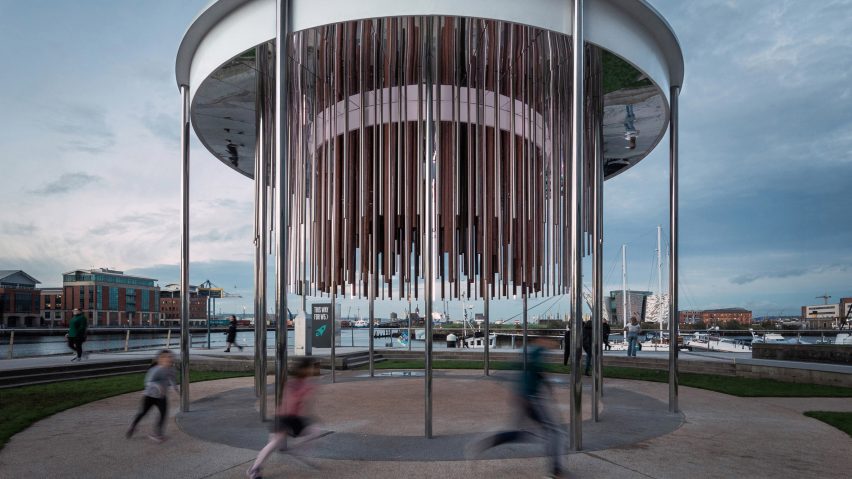Architects Eunan Deeney, Matthew Kernan and Hannah Wilson have created the five-metre-tall SoundYard musical pavilion on Queen's Quay in Belfast, Northern Ireland.
The ten-metre-wide circular canopy with central oculus is supported on 16 slim columns, from which hang two concentric sets of suspended rods.
Walking, running or playing below the structure triggers motion sensors that cause the mechanisms in the canopy to turn slowly, striking the hollow tubes around them.
The instrument was designed so that the music it creates gets louder as more people interact with it.
"In order for the installation to project its maximum sound, collaborative effort is needed by its users to set off all hidden motion sensors," explained architect Kernan.
"These were carefully placed in order for them not to be apparent and introduce curiosity," he told Dezeen.
The outer ring of reflective metal tubes were designed to act as a visual and acoustic barrier, encouraging visitors to investigate the structure.
The inner veil was made from weathered tubes as well as the exposed turning mechanisms responsible for the auditory element of the design.
"The mirror-polished columns and soffit heighten the space whilst also creating an element of play within themselves, as users intrigued by their distorted figures point and play with their reflections," explained architect Kernan.
The resulting soundscape was designed to be reminiscent of the constant, rhythmic noises of striking, hammering and riveting that defined Belfast's Maritime Mile when shipbuilding was at its peak.
The installations' site, which housed a brass foundry and coal yard in the 18th and 19th centuries, was more recently occupied by an open grass amphitheater, which informed its current use.
"We chose to work with [the existing site] and created SoundYard as a performance space for people to gather within and around" added Kernan.
The large-scale musical instrument stands near the Harland and Wolff shipyard, which is famed for the construction of the ocean liner Titanic, where the Titanic Belfast museum now stands.
Its construction was funded by the Titanic Foundation following a design competition in 2019 run by the Royal Society of Ulster Architects for emerging architects to create a structure that integrated the concept of play into Belfast's cityscape.
Architects Eunan Deeney, Matthew Kernan and Hannah Wilson are graduates of the University of Ulster, Queen's University Belfast and University of Westminster respectively.
Other musical installations recently featured on Dezeen include Sonic Bloom by Yuri Suzuki, The Soundwave by Penda and Lullaby Factory by Studio Weave.
The photography is by Joe Laverty.
Project credits:
Architects and designers: Eunan Deeney, Matthew Kernan, Hannah Wilson
Client: Maritime Belfast Trust
Collaborators: Todd Architects
Principle designer: Dimensions CDM Consultants
Structural engineers: RPS
M&E: Arup
Cost consultants: WH Stephens
Principal contractor: Fabrite

